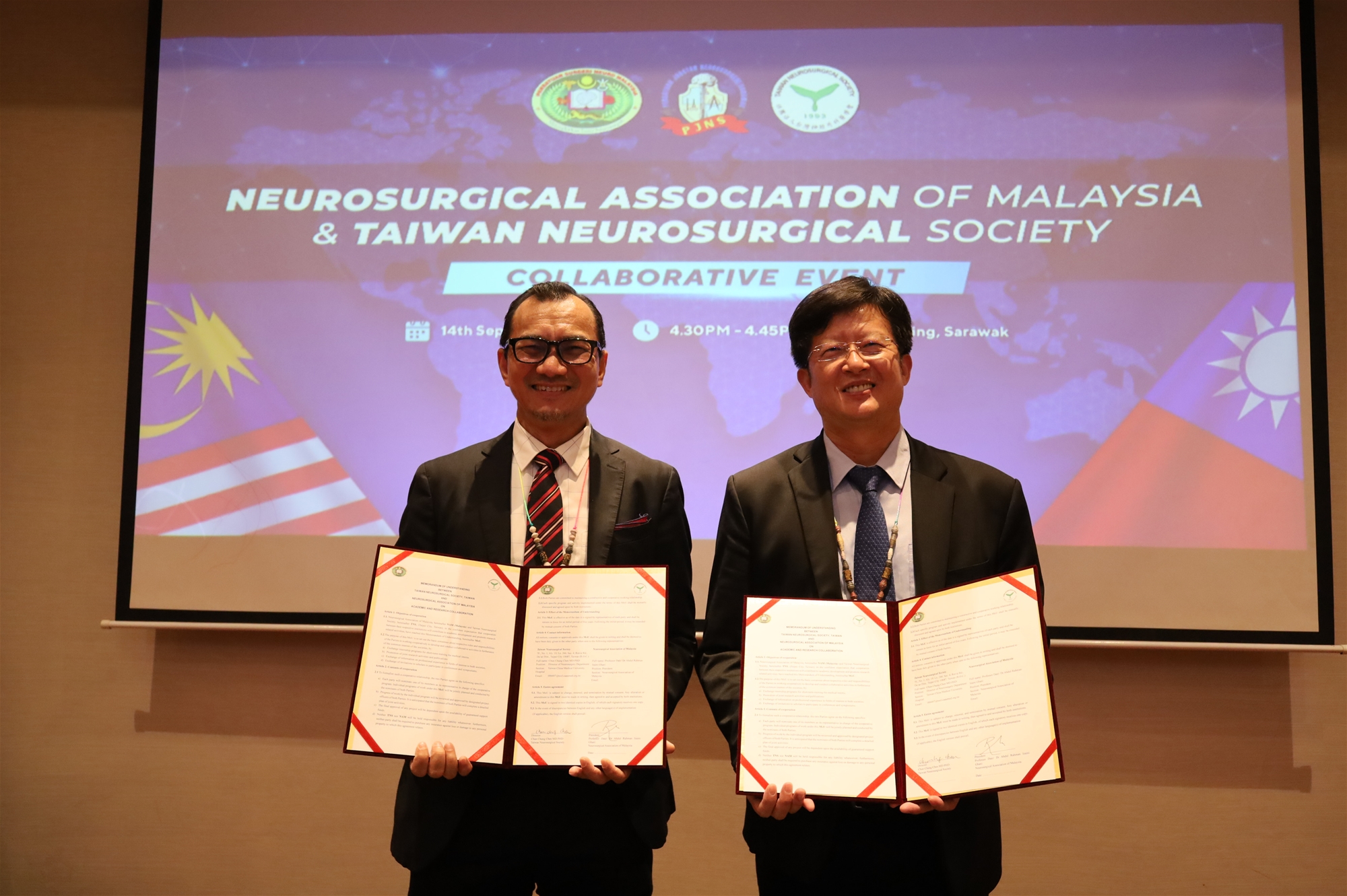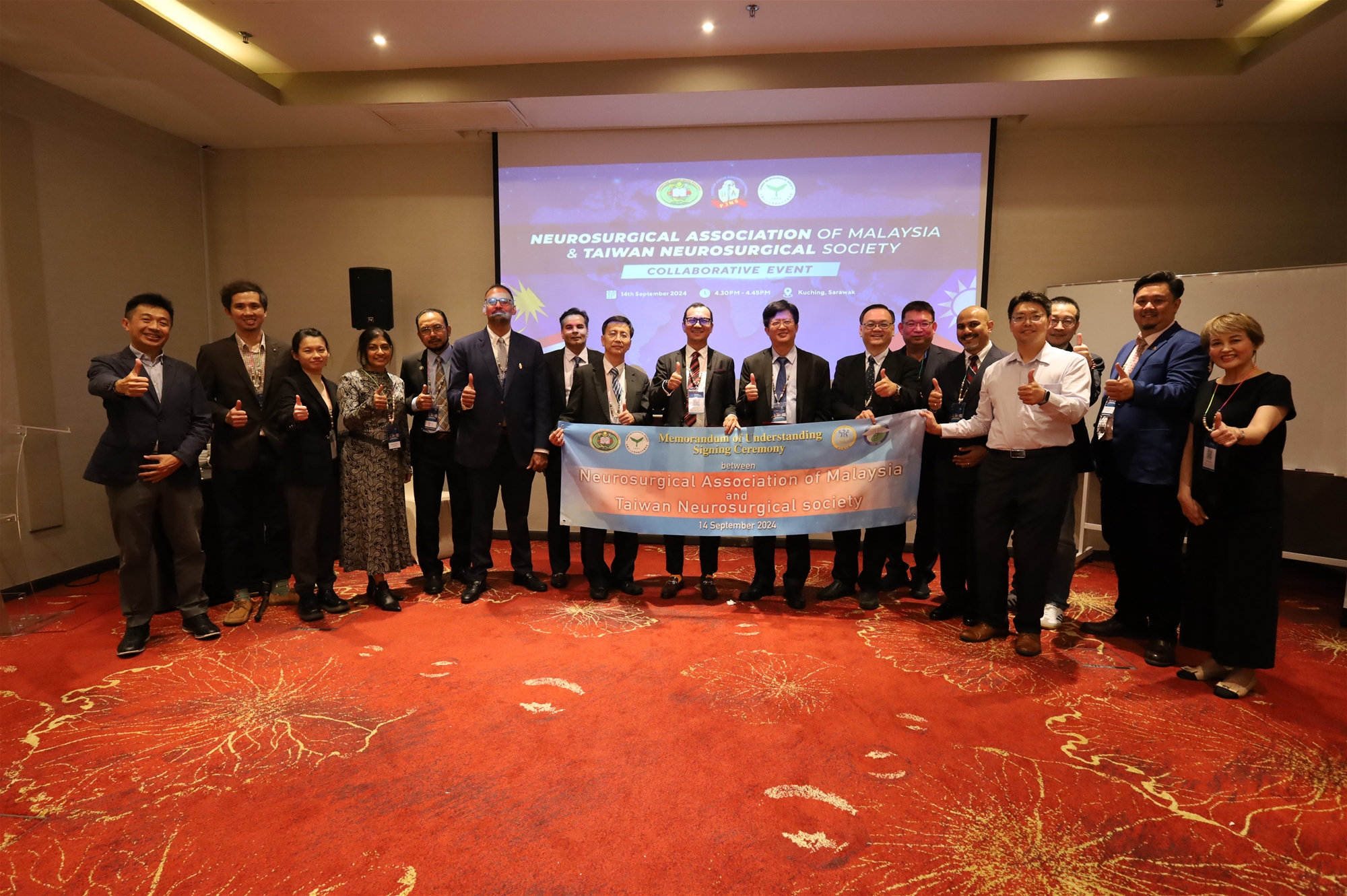News and Award
About CMUH
Successful Experience in Cell Therapy at CMUH Promoted to Malaysia Taiwan and Malaysia Neurosurgical Societies Sign MOU to Enhance Medical and Health Cooperation
China Medical University Hospital(CMUH, Taiwan) has achieved notable success in cell therapy. Ms. Lin, who was diagnosed with malignant glioma, underwent tumor removal surgery, followed by radiation therapy and dendritic cell immunotherapy. After four years of monitoring, her condition remains stable, and she maintains a good quality of life. Dr. Chen Chun-Chung, Director of Neurosurgery, stated that this is a highly difficult-to-treat malignant tumor. The patient's positive attitude, combined with advanced cell therapy, has yielded impressive results, which is very encouraging. Neurosurgery is a strong suit and specialty of Chung Shan Medical University Affiliated Hospital. Advanced medical technologies first benefit domestic patients before expanding internationally. On September 14, three physicians from the China Medical University(CMU) healthcare system were invited to speak at the “Sarawak Neurosurgery Update & Neurosurgical Association of Malaysia Annual Scientific Meeting 2024. (NAM-SNU ASM 2024)” Dr. Chen Chun-Chung shared successful experiences in cell therapy, and the Taiwanese and Malaysian Neurosurgical Societies signed an MOU to strengthen medical exchange and cooperation.
Chief Chen Chun-Chung of the of Neurosurgery Department at CMUH (right) represented the Taiwan Neurosurgical Society to sign a MOU with Prof. Dato Dr. Abdul Rahman Izaini Ghani, President of the Neurosurgical Association of Malaysia,
in Kuching, Malaysia. This marks a new milestone in neurosurgical exchanges and cooperation between Taiwan and Malaysia. Moving forward, it will allow neurosurgeons in hospitals across Malaysia to gain comprehensive insights into Taiwan's advanced medical technologies, promoting significant benefits under the New Southbound Policy and showcasing Taiwan to the world.
Taiwan's First Participation in the NAM-SNU ASM: MOU Signed with Malaysian Society, Highlighting New Southbound Policy
Following the “Taiwan-Malaysia Neurosurgery Advanced Medical Summit 2024” organized by the Taiwan Neurosurgical Society in July of this year, Dr. Chen Chun-Chung,
Chief of Neurosurgery Department, Dr. Brian Chiu Cheng-Di, Director of Minimally Invasive Spine Neurosurgery (Deputy Director of the Spine Center), and Dr. Chuang Hao-Yu, Director of the Cell Therapy Center at Tainan City An Nan Hospital (Neurosurgery Director), were invited to the " NAM-SNU ASM 2024". This is the first time Taiwanese physicians have participated in this conference. The Taiwan Neurosurgical Society(TNS) and the Neurosurgical Association of Malaysia(NAM) signed a memorandum of understanding (MOU) at the conference, marking a significant highlight in the advancement of Taiwan-Malaysia neurosurgical research exchange.
Cutting-edge and Diverse Neurosurgical Techniques Attract Malaysian Physicians to Taiwan for Learning
At the conference, three physicians from CMU healthcare system shared their experiences in neurosurgery, including brain cancer, stroke, and endoscopic spine surgery. Their presentations garnered attention from the conference and participating physicians, leading to enthusiastic discussions.
Dr. Chen Chun-Chung shared that in 2000, Ms. Lin was diagnosed with malignant glioma after experiencing seizures. This type of brain cancer is challenging to manage. However, Ms. Lin was proactive and brave, with strong family support. After tumor removal surgery and radiation therapy, she underwent dendritic cell immunotherapy and completed a series of ten vaccine injections. Her condition has been monitored for over four years, showing good results. Dr. Chen noted that historically, after surgery for malignant gliomas, only radiation therapy and 1-2 types of targeted treatments were available, making treatment very difficult. The average survival rate post-treatment was 15 months, while the average at their hospital is 23 months, and Ms. Lin has exceeded four years. The hospital’s cell therapy has advanced to CAR-T cell therapy, continuously improving cancer treatment outcomes. They are pleased to share Taiwan's clinical experience in cell therapy with Malaysia to promote the exchange of new medical knowledge.
Dr. Brian Chiu Cheng-Di discussed Taiwan's extensive clinical experience in endoscopic spine surgery. This technique can be used for full-spine disc removal and degenerative spinal stenosis decompression, as well as fusion, infection, and tumor surgeries. With enhanced imaging and endoscopic views, surgeons can target areas typically obscured in traditional surgery, reducing surgical risks and offering benefits like smaller wounds and faster recovery. However, more rigorous evaluation is needed for cases with structural abnormalities, large lesions, multiple segments, malignancy, or bleeding tendencies. Dr. Chiu’s compelling presentation led three Malaysian experts to sign up to visit China Medical University Hospital for learning.
Dr. Chuang Hao-Yu shared two experiences from Taiwan. First, intracerebral hemorrhagic stroke in Asia has a higher incidence compared to Western societies, with higher mortality and disability rates, leading to medical, family, and societal issues. The presentation included results from using a complex surgical system and a locally developed robotic surgical navigation system for precise minimally invasive intracerebral clot aspiration, which significantly reduced mortality and effectively lowered neurological disability compared to traditional open surgeries. Second, he shared the development of interventional vascular treatment in Taiwan. Efforts by six major related medical societies have successfully integrated clinical practice, certification training, and accreditation systems, and this experience was also shared with Malaysia.
Chou Aichi, CEO of the International Center at CMUH, stated that this is the third year the hospital has been implementing the Ministry of Health and Welfare's "New Southbound Medical and Health Cooperation and Industry Development" project. Neurosurgery has been designated as a key area for Taiwan-Malaysia medical exchange, including seminars, hospital visits, health lectures, and physician training in Taiwan. At this year’s conference, Taiwanese medical and health providers, including Brain Navi Biotechnology and EPED Inc., also participated in the exhibition. The MOU signed between the TNS and the NAM will enable neurosurgeons across Malaysia to learn about Taiwan's advanced medical technologies, significantly advancing the New Southbound Policy and showcasing Taiwan to the world.
Chief Chen Chun-Chung (right 8) of the of Neurosurgery Department at CMUH represented the Taiwan Neurosurgical Society to sign a MOU with Prof. Dato Dr. Abdul Rahman Izaini Ghani (right 9), President of the Neurosurgical Association of Malaysia, in Kuching, Malaysia. This marks a new milestone in neurosurgical exchanges and cooperation between Taiwan and Malaysia. Moving forward, it will allow neurosurgeons in hospitals across Malaysia to gain comprehensive insights into Taiwan's advanced medical technologies, promoting significant benefits under the New Southbound Policy and showcasing Taiwan to the world.




